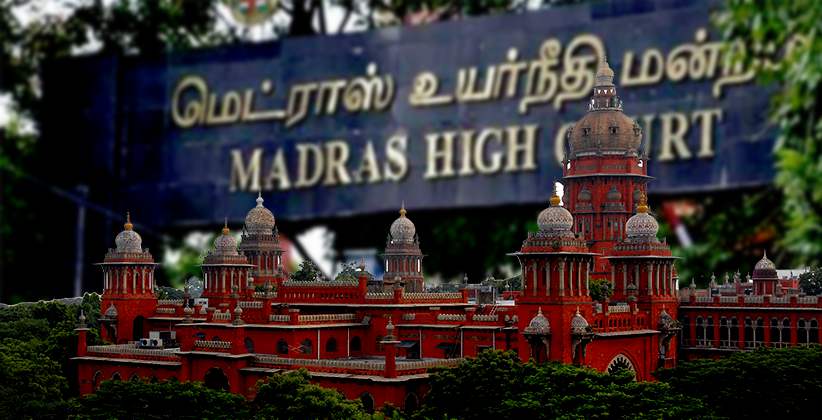"No Banking Business Can Be Undertaken In India Without Valid RBI Licence": Madras High Court

The Madras High Court while emphasizing on the fact that no banking business can be undertaken in this country without obtaining a license from the Reserve Bank has recently observed that Repatriates Cooperative Finance and Development Bank Limited (“REPCO Bank”) is neither a bank nor a secured creditor within the meaning of the relevant word and expression in Securitisation and Reconstruction of Financial Assets and Enforcement of Security Interest Act, 2002 (“SARFAESI Act”).
“A bank is defined in Section 2(1)(c) of the Act of 2002. The respondent cannot demonstrate that it is a banking company or a corresponding new bank or State Bank or a subsidiary bank or even a multi-state co-operative bank. There is no doubt that the respondent is a multi-state co-operative society, but a multi-state co-operative society need not be a multi-state co-operative bank.”, Division Bench of Hon’ble Chief Justice Sanjib Banerjee & Justice Senthilkumar Ramamoorthy noted.
In the present matter, the petitioner obtained credit facilities from REPCO Bank. On April 20, 2017, a notice was issued u/s 13(12) of the SARFAESI Act upon petitioner’s failure to repay the dues within time. On November 15, 2019, further notice was issued u/s 13(12) of the SARFAESI Act for taking possession of the petitioner’s secured assets. After that, the petitioner filed a petition praying for issuing a writ of certiorari to call for records of the Respondent’s file & quash the proceedings dated 20.04.2017 & 15.11.2019 on the ground that they were illegal, incompetent, unconstitutional and without jurisdiction.
The Petitioner’s Counsel contended that the Respondent was not a bank at all and, thus, couldn’t be regarded as a secured creditor within the meaning of the relevant expression in the SARFAESI Act. While asserting that the steps taken by the Respondent were void & without jurisdiction, the counsel relied on paragraph 12 of the affidavit filed by the Reserve Bank in W.P.No.9623 of 2019 before this Court in which RBI indicated that REPCO BANK, was initially registered under the Madras Cooperative Societies Act, 1961 as a cooperative society, was deemed to be registered under the Multi-State Co-operative Societies Act, 2002 as a multi-state cooperative society, but had not been issued a banking licence by the RBI and did not come under the regulatory purview of Reserve Bank of India.
The issue that arose for consideration was whether REPCO Bank is authorized to invoke the Securitisation and Reconstruction of Financial Assets and Enforcement of Security Interest Act, 2002.
The Bench, while elaborating on the five limbs contained in the definition of a secured creditor u/s 2(zd) of SARFAESI Act, the first of them being a bank or financial institution; the second and fourth being debenture trustees; the third being an asset reconstruction company and the fifth being any other trustee holding securities on behalf of a bank or financial institution observed that the Respondent was not a secured creditor as the last four limbs could not cover it and did not proclaim to be answering any of such descriptions.
“A secured creditor within the meaning of aforesaid definition may be a bank or a financial institution or any consortium or group of banks or financial institutions to satisfy the first limb of the definition; and, such bank or banks or financial institution or institutions must also hold securities by way of financial assets as defined in clause (l) of Section 2(1) of the Act which is the definition provision.”, the Court further observed.
Further, the Bench also observed that the respondent could not demonstrate that it was a banking company or a corresponding new bank or State Bank or a subsidiary bank or even a multi-state co-operative bank. It was also noted that there was no doubt that the respondent was a multi-state co-operative society. Still, a multi-state co-operative society need not be a multi-state co-operative bank.
In this context, the Court also observed that
“The respondent is not a financial institution within the meaning of the expression in Section 2(1)(m) of the Act of 2002. The several limbs under clause (m) cover a public financial institution; specified institutions; the International Financial Corporation; a debenture trustee; an asset reconstruction company and other institutions as may be notified by the Central Government. There is no document or any shred of paper relied upon by the respondent to indicate that it falls within any of such limbs of clause (m) of the definition provision.”
Reliance was placed by the Bench on the second legal question with regards to whether the expression, 'banking company', as defined under Section 5(c) of the Act of 1949, covered cooperative banks registered under the State cooperative laws or as multi-state cooperative societies in Pandurang Ganpati Chaugule v. Vishwasrao Patil Murgud Sahakari Bank Limited (2020) 9 SCC 215. In this judgement, the Court discussed the issue in paragraphs 103 to 122 & in the concluding paragraphs, it was observed that only cooperative banks were found to be banks and covered under "Banking" in List-I, Entry 45 of the Seventh Schedule to the Constitution.
Thus the Bench, while allowing the appeal, observed that REPCO cannot resort to any of the measures u/s 13 or otherwise under SARFAESI Act but can take recourse against the defaulting debtor by carrying his claim to an appropriate forum such as Civil Court by invoking the provisions under Order XXXIV of the Code of Civil Procedure,1908.
“However exalted may have been the venue of any meeting pertaining to the respondent, the character of the organisation and the bounds of its authority must be found in legal provisions”, the Court observed.
Case Title: SP Ganeshan v. The Authorised Officer, REPCO Bank
Law Point/Statute Involved: Section 2(1)(c), Section 2(1)(zd) & Section 13 of the Securitisation and Reconstruction of Financial Assets and Enforcement of Security Interest Act, 2002
